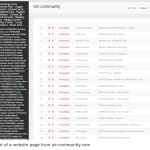Seen an ad on Facebook for amazing items of clothing? Stuff that you just don’t find in the shops? Well, if these bargains seem too good to be true, they almost always are.
Further, once you show an interest in an ad, the same and similarly themed clothes will keep popping up on your timeline, trying to make you want whatever it is even more.
Of course, the scammers behind these shops are not only attracted to selling clothes, it could be anything. It’s just that we all need clothes and they are selling great items at what usually appears to be a knock down price. Just for the purposes of this article, scam clothing ads and their associated websites are what I’m talking about here.

NOTE: There are, of course, a great many legitimate clothes selling companies that have Facebook ads and I wouldn’t want to give the impression that there aren’t.
What are some signs of a scam clothes shop website?
Having investigated quite a few of these Facebook clothing shop ads and the linked websites, it’s fair to say that a great many of the ‘too good to be true’ ones are scams. It’s easy to run a batch of ads on Facebook and, because of the sheer number of visitors the site has, it’s a very attractive way to promote your goods.
In general, before you buy any clothes via a Facebook ad, look out for the following (I’ll tell you how to check this further down in the article):-
- A recently registered domain name (www.websitename.com) – usually in the last few weeks/months.
- A domain name only registered for one year. Genuine sites tend to be registered for a minimum of two or more years. The longer a domain name shows as being registered by the same person/company, the more confidence it inspires.
- Facebook scam ads often say they are having a sale, or they have a “shutting down due to the Pandemic, all stock must go” type of notice. Whatever, they want you to buy straight away.
- Comments under Facebook ads are a good indication of what others think about the seller, so it’s worth checking them out.
- There may be some laughing emojis under the ad, implying that it’s amusing that anyone would take the ad seriously.
- The seller’s website shows there isn’t any way to contact them other than an email address.
- You have no idea who owns the site, or where they are based in the world.
- Countless other websites are using exactly the same text.
- Because Facebook knows the kind of things you like, the scam sites that pop up in front of you will often all look the same (or similar), and sell the same sort of things. The layout will often be pretty much the same on all the sites, or perhaps there’s just a slight variation on a theme. Many of these sites may well have been created by the same people.
Will I get my goods if I buy from these scam clothing sites?
Poor quality clothes…
You may or may not receive the item. If you do, customers usually complain about the wrong size, shape, colour and poor quality etc. Getting a refund will be a nightmare and emails will go unanswered. Many people just write their purchase off as a bad experience, and scammers capitalise on that.
Completely different items sent…
Often you will receive a completely different item to the one you ordered. I know of someone who bought a pair of training shoes from one such site. All looked legitimate, but the first concern was that there was no purchase confirmation email. Emails to the seller asking them to confirm the sale went unanswered.
A couple of weeks later a plastic, see-through shower cap worth all of about 10p turned up instead of the shoes. It was like something you’d find in a really cheap Christmas cracker.
Getting a refund… or not
On behalf of the buyer I complained to PayPal. PayPal’s first response was that the shower cap had to be sent back to the seller ‘Signed For’ (to prove receipt), before a refund would be given. The cost of sending the shower cap back? £36, because the seller’s location was a building in the middle of Shanghai, in China. Of course, sending a shower cap worth all of 10p back to China was clearly not a viable option! On that occasion I’d managed to find the seller’s physical address – not from their website, but by looking up details of their domain name. Usually, however, such sites hide any contact information, precisely so that you can’t find them.
When in discussion with PayPal, I outlined the arguments for not sending the shower cap back to China. I was also able to show them numerous bad reviews and complaints about the shoe company that I’d found on the Web.
Eventually PayPal was persuaded by my argument and refunded the cost of the shoes, taking the money from the seller’s account. They also managed to get the seller’s shop shut down.
The problem is, these scam shops keep popping up and it’s hard to police them. They use the same site or an extremely similar version, just put it on a new domain name and off they go again, fleecing more people. And once the domain name expires, the website will disappear a short while afterwards.
How to check whether a clothing website is legitimate
1. Try to find genuine customer reviews
Firstly, an easy thing: Google the seller’s domain name plus the word ‘review’. e.g. scammer.com review. If there are any reviews for this site, they often pop up in a search.
Quite often you will see repeatedly dreadful feedback for such sellers and that, alone, should be enough to put you off buying.
Remember that not finding reviews doesn’t, of course, mean the shop is either good or bad. It just means there perhaps aren’t any reviews, or that the shop hasn’t been around long enough to produce any.
2. Look up their domain name
Look up their domain name to see when they first registered it, and for how long. You can check their domain registration details here:
Just type in theirdomainname.com to the search box (of course use the seller’s domain name, no www prefix needed either). If they’ve only just registered it, ask yourself why that might be, and also why it’s only been registered for a very short time?
The bottom line is that a legitimate business usually registers their domain name for a minimum of two years.
3. Check out their website content
Copy a line of text – preferably from the ‘About’ page on their website. Just a sentence will do. Take that text and do a Google search on it. From the search results that appear, note how many websites are using that same text. Take a good look at some of them and you’ll see that they are all very similar. What does that tell you?
4. Check out their address (if you can find it)
If there is an address on their site (hugely unlikely) you need to do a Google search on it. Note how many other ‘businesses’ are operating from the same location (which often turns out to be the same room in the same building).
Granted, if you’re operating your business from a private house you have a good reason for not showing your full address. However, as a bare minimum you should at least have a phone number and email address, plus it’s a good idea to give site visitors an idea of your location e.g. town and county. The point is, it’s expected that a legitimate business will have reasonable contact details.
These sellers just want your money before they disappear!
As you can see from the above, the goal of scam sellers is to open up a shop – often just before Christmas – and then shut it down quickly. In other words, ‘take your money and run’.
Sometimes their shop is shut down by the authorities and other times the domain name will expire and the shop just disappears… until it pops up under a different name of course.
What are Facebook doing to stop scam clothing ads?
Facebook do shut down ads for fake shops, but part of doing that relies on people contacting them to tell them about the scammer. And for every shop that gets shut down, more are always there to replace it.
Perhaps Facebook could do more to stamp this out, but I do appreciate that it is not easy, particularly as there are so many Facebook ads.
DO YOUR RESEARCH…
The best thing is to do your research so that you won’t get scammed by dodgy Facebook sellers. Make sure you do your bit to put them out of business.






